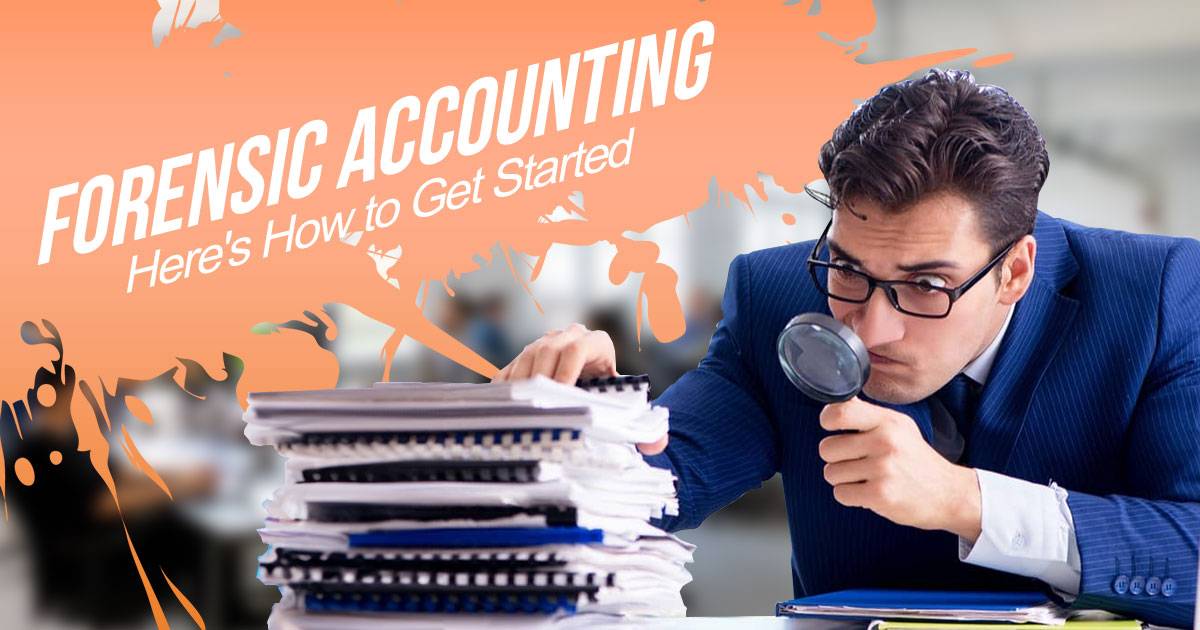Your Career Path to Forensic Accounting: Here’s How to Get Started

Forensic accounting brings together finance, investigation, and law into a captivating field. Forensic accountants are essential for discovering financial fraud, tracking down assets, and offering expert testimony in legal cases. If you want to become a forensic accountant, you need to know the steps you must take.
Getting To Know Forensic Accounting
Forensic accounting examines financial records and transactions using accounting, auditing, and investigation techniques. It investigates financial crimes such as embezzlement, money laundering, and securities fraud. Forensic accountants also help in legal cases by calculating damages and resolving business disputes.
What is a forensic accountant?
A forensic accountant is a highly trained specialist who examines financial records and transactions using accounting, auditing, and investigation techniques. Their responsibilities include investigating financial fraud, spotting inconsistencies, and offering expert analysis in court procedures.
Forensic accountants investigate financial crimes such as embezzlement, money laundering, and securities fraud. They also assist in resolving disputes and providing litigation support by quantifying financial damages and presenting findings in a clear and objective manner.
What does a forensic accountant do?
A forensic accountant investigates financial records and transactions with professional accounting, auditing, and investigative abilities. Their primary tasks include:
- Detecting Financial Fraud: Identifying and investigating instances of financial fraud such as embezzlement, money laundering, and securities fraud.
- Examining Financial Records: Examining financial statements, transactions, and records to identify anomalies or abnormalities.
- Providing Litigation Support: Assisting with legal actions by calculating financial damages, drafting reports, and giving expert testimony in court.
- Tracing Assets: Tracking and tracing financial assets to determine their origin and movement.
- Preventing Future Fraud: Advising organizations on implementing controls and procedures to prevent future instances of financial misconduct.
- Collaborating with Law Enforcement: Collaborating closely with law enforcement authorities and legal professionals to obtain evidence and aid criminal investigations.
Forensic accountants are crucial in maintaining financial integrity, resolving disputes, and ensuring compliance with legal and regulatory standards.
How to be a forensic accountant?
Becoming a forensic accountant involves several key steps:
Earn Forensic Accounting Education Requirements
To become a forensic accountant, you must fulfill certain educational criteria. Most employers expect you to have a forensic accounting degree or a bachelor’s degree in accounting, finance, or business administration. During your studies, prioritize courses on accounting concepts, auditing, and financial analysis.
Some universities provide specialist programs in forensic accounting or fraud investigation. These programs equip students with the skills needed to investigate financial crimes and testify as experts. Consider interning at a forensic accounting firm or a government agency to obtain practical experience and broaden your professional network.
Gain Experience
Internships or entry-level work in accounting or auditing can help you get valuable practical experience. This hands-on experience is extremely beneficial in comprehending real-world financial processes.
Pursue Specialized Education
Consider obtaining a master’s degree or taking specialized coursework in forensic accounting. This advanced education provides a thorough understanding of investigation procedures and fraud examinations.
Obtain Certifications Related to Forensic Accounting
Many forensic accountants pursue professional certifications and bachelor’s degrees to demonstrate their expertise and dedication. Forensic accountants need a CPA certification to enhance their credibility and job prospects in forensic accounting.
To become a CPA, you must take the Uniform CPA Examination, which covers auditing, financial accounting, regulatory issues, and business ideas. Each state has specific CPA requirements, so verify with your state board of accountancy for more information. The Association of Certified Fraud Examiners (ACFE) also offers the Certified Fraud Examiner (CFE) certification, which focuses on fraud prevention, detection, and investigation in financial forensics.
Develop Investigative Skills
Hone your analytical and investigative skills. Forensic accountants must be detail-oriented, critical thinkers capable of analyzing complex financial data and identifying irregularities.
Network and Gain Practical Experience
Create a network among the forensic accounting community. Networking can lead to opportunities for mentorship, career leads, and staying current on industry trends.
Continuing Education in Forensic Accounting
Forensic accounting is a constantly evolving discipline that incorporates new technologies, rules, and methodologies. Continuous professional development is vital for remaining competitive and effective in your work.
Attend conferences, workshops, and webinars to stay updated on the latest trends and practices. Join professional organizations like the ACFE or AICPA to network with peers and access training and resources.
Look into obtaining extra qualifications or specializations to improve your talents. For instance, becoming a Certified Information Technology Professional (CITP) can focus on digital forensics, or obtaining a Certified Valuation Analyst (CVA) certification can specialize in business valuation.
Stay Current
Continuously educate yourself on developments in accounting standards, legal regulations, and technological advancements relevant to forensic accounting.
By taking these steps and remaining devoted to professional growth, you can work toward becoming a successful forensic accountant. Forensic accountants are important in identifying financial crimes and offering professional financial analysis.
Career Outlook and Salary of Forensic Accountants
Forensic accounting offers promising career prospects, with a projected 4% job growth from 2022 to 2032, slightly faster than average. Demand is increasing as fraud and cybercrime become more prevalent.
According to the Bureau of Labor Statistics, the average annual wage for accountants and auditors in the United States was $79,880 in May 2023. However, forensic accountant salaries vary depending on experience, region, and employer.
According to the Association of Qualified Fraud Examiners (ACFE), qualified forensic accountants make about 25% more than their non-certified peers. Their 2022 Compensation Guide provides detailed salary insights for forensic accountants and anti-fraud professionals.
Start Your Career Journey as a Forensic Accountant
Forensic accounting is an exciting career that combines finance, investigation, and legal knowledge. Forensic accountants are essential for detecting financial fraud, providing expert testimony, and supporting legal cases. To enter this field, focus on getting the right education, gaining practical experience, and obtaining certifications like CPA or CFE. Stay updated with professional development, build networks, and sharpen your investigative skills to succeed as a forensic accountant.
